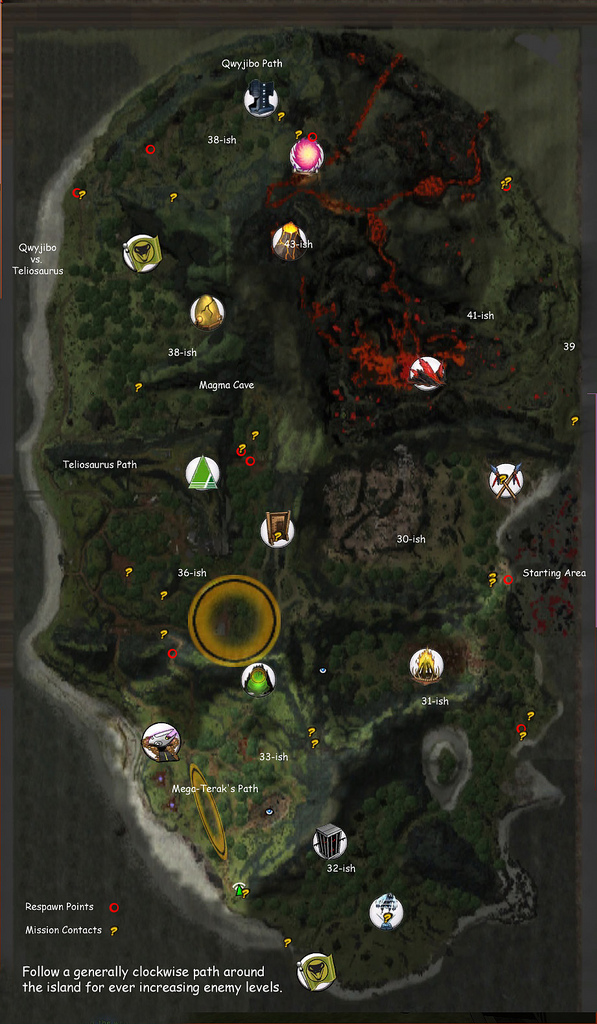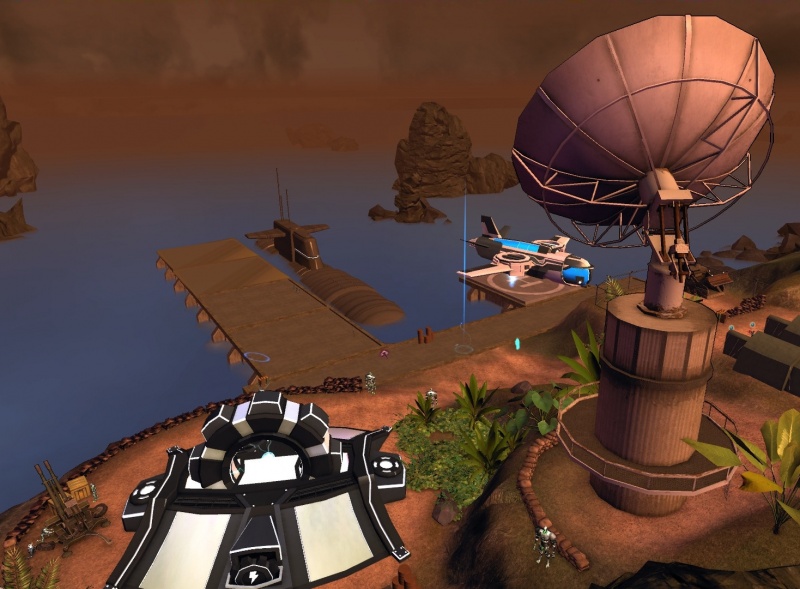Difference between revisions of "Monster Island"
m (fixed broken file link) |
|||
| Line 5: | Line 5: | ||
<div style="color:#FF9933; background-color: black">Overview</div> | <div style="color:#FF9933; background-color: black">Overview</div> | ||
| − | |||
| − | + | On a remote island about a hundred miles | |
| + | off the eastern coast of Japan lies a volcanic atoll | ||
| + | dubbed by the Tokyo press “Monster Island.” This | ||
| + | rocky, mountainous island, approximately six miles | ||
| + | in diameter at its widest point, is the home of a | ||
| + | government base designed to study xenoforms, or | ||
| + | “monsters.” Monster Island is nothing less than | ||
| + | a game preserve and habitat for unique or alien | ||
| + | creatures too dangerous to hold captive or study | ||
| + | anywhere else. Among its permanent inhabitants are | ||
| + | the famous monsters [[Qwyjibo]], [[Teleiosaurus]], Ganika, Vakulon, and [[Mega- | ||
| + | Terak]], as well as the enormous atomic mutant lizard | ||
| + | Zorgatha.<br> | ||
| + | The base, run by the Japanese government, is | ||
| + | protected by a powerful force-field generated by | ||
| + | equipment “liberated” from the alien [[Qularr]] (who | ||
| + | attempted to invade Earth in 1965 using several of | ||
| + | the monsters now living in the habitat). The facility | ||
| + | is at the foot of the currently dormant volcano, with | ||
| + | one level above ground protruding from a rock wall, | ||
| + | and the remaining four levels below ground. The | ||
| + | entire base is serviced by an undersea tunnel that | ||
| + | passes under the force field and out onto the ocean | ||
| + | floor, where a pressurized portal can dock a submarine | ||
| + | for supply and staff rotation.<br> | ||
| + | The Japanese government department for | ||
| + | dealing with the paranormal, known as [[Bureau | ||
| + | 17]], works closely both with American officials and | ||
| + | [[UNTIL]] to handle the giant monsters the area is | ||
| + | known for. Indeed, [[Bureau 17]] includes some of the | ||
| + | world’s leading experts on xenobiology, as well as | ||
| + | robotics and artificial intelligence. Monster escapes | ||
| + | are rare but not unknown, and [[Bureau 17]] maintains | ||
| + | good relations with Japanese supers for precisely | ||
| + | this reason. Super-scientist Takashi Toru has retired | ||
| + | from active duty and now devotes his time to studying | ||
| + | both the monsters and the various pieces of | ||
| + | technology the [[Qularr]] left behind (though most | ||
| + | of the latter remain utterly incomprehensible to | ||
| + | humans). | ||
<center>[[Image:Monster_Island_Echos_1.jpg|800px]]</center> | <center>[[Image:Monster_Island_Echos_1.jpg|800px]]</center> | ||
Revision as of 19:14, 10 November 2020

Monster Island
On a remote island about a hundred miles
off the eastern coast of Japan lies a volcanic atoll
dubbed by the Tokyo press “Monster Island.” This
rocky, mountainous island, approximately six miles
in diameter at its widest point, is the home of a
government base designed to study xenoforms, or
“monsters.” Monster Island is nothing less than
a game preserve and habitat for unique or alien
creatures too dangerous to hold captive or study
anywhere else. Among its permanent inhabitants are
the famous monsters Qwyjibo, Teleiosaurus, Ganika, Vakulon, and [[Mega-
Terak]], as well as the enormous atomic mutant lizard
Zorgatha.
The base, run by the Japanese government, is
protected by a powerful force-field generated by
equipment “liberated” from the alien Qularr (who
attempted to invade Earth in 1965 using several of
the monsters now living in the habitat). The facility
is at the foot of the currently dormant volcano, with
one level above ground protruding from a rock wall,
and the remaining four levels below ground. The
entire base is serviced by an undersea tunnel that
passes under the force field and out onto the ocean
floor, where a pressurized portal can dock a submarine
for supply and staff rotation.
The Japanese government department for
dealing with the paranormal, known as [[Bureau
17]], works closely both with American officials and
UNTIL to handle the giant monsters the area is
known for. Indeed, Bureau 17 includes some of the
world’s leading experts on xenobiology, as well as
robotics and artificial intelligence. Monster escapes
are rare but not unknown, and Bureau 17 maintains
good relations with Japanese supers for precisely
this reason. Super-scientist Takashi Toru has retired
from active duty and now devotes his time to studying
both the monsters and the various pieces of
technology the Qularr left behind (though most
of the latter remain utterly incomprehensible to
humans).

External Links